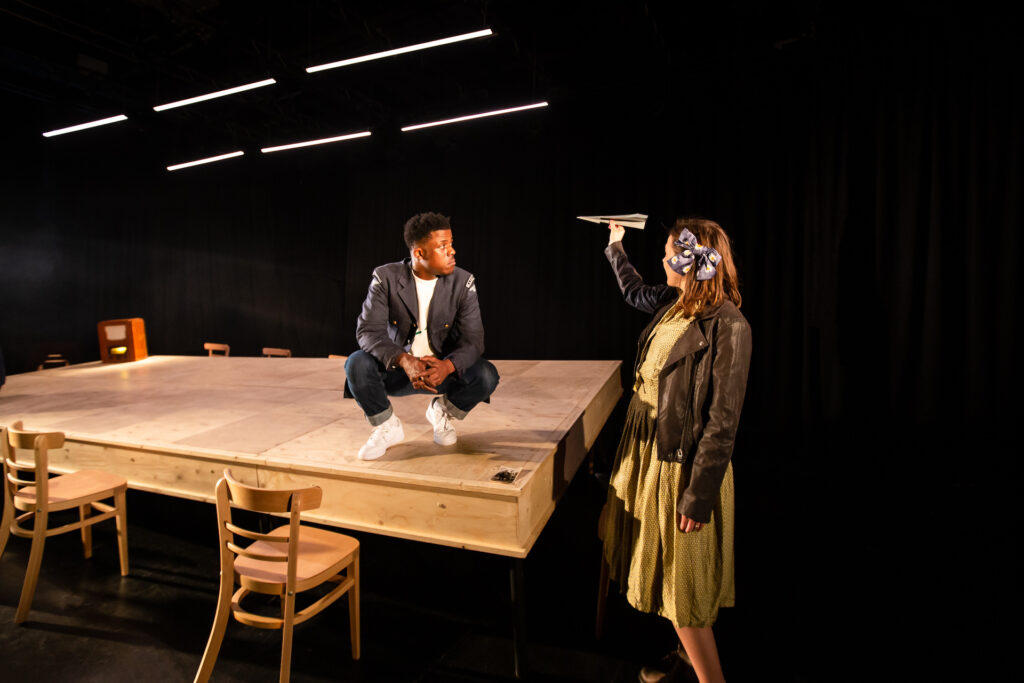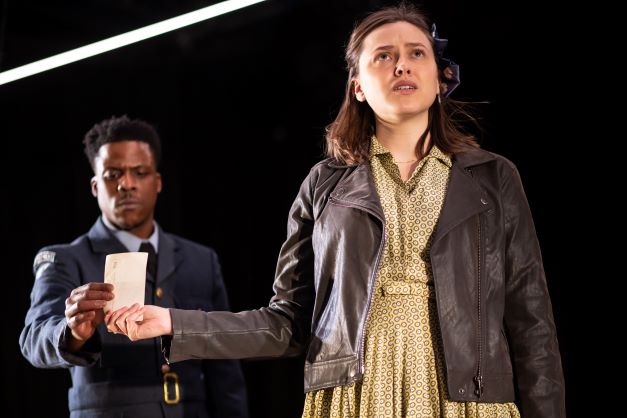
21 – 25 March
What is the Winston Machine and what does it represent? In this piece of experimental theatre making by Kandinsky, we are forced to examine our national obsession with WWII and its continual grip on a predominantly conservative population becoming more desperate to cling to past glory for comfort. The Winston Machine flies us back and forth between the 1940’s and the present day with, at times, bewildering changes of forward and reverse gears.
On a simple, bare, slightly tilted stage, lit simply from above by strip lights that occasionally change colour and brightness to accentuate mood, we glimpse a claustrophobic world in which a father, Mark played by Daniel Millar, clutches at the heroism of his WWII air ace father for a sense of worth, while his sheltered daughter Becky (Elinor Crawley) idolises her stylish grandmother, posting her black and white wedding photo on Instagram. A Forties Commemorative Festival is planned in their home town, and Becky’s dad is determined that the singing talents of his daughter will take centre stage. And it is Becky that gives us that delicious and enticing nostalgia with her soft and smooth renditions of old classics such as ‘Every Time We Say Goodbye’, “Again’, and ‘The Very Thought of You’.
Kandinsky don’t like to make life simple. Alongside bigger themes of sexism, racism and colonialism, which are referenced throughout, come more intimate weavings of a more personal variety. Becky has a fiancé, Dave (also played by Millar). Dave is anxious to become a home owner: more so, you are led to believe, than he wants to understand how his future life partner thinks and feels. As the pressure mounts on Becky to buy into the plan, along comes an old flame, musician Louis (Toyin Omari-Kinch), who threatens to blow the potential marriage and house-buying out of the water, and who confronts Becky’s dad with his beloved Churchill’s less than squeaky clean record on race and workers rights. His modern take on Forties’ ballads sees the show’s one gloriously uninhibited moment, where he attempts to persuade Becky to perform ‘I Love You baby’ to a ska rhythm for the upcoming Festival. But then they both remember what the audience is likely to be.
Millar, Crawley and Omari-Kinch have to carry the evening on their own acting merits; there are few props but for an RAF uniform and some paper aeroplanes. That they negotiate a seething 80 minutes of baby boomer bigotry and fragile millennial identity is impressive. The writing is hugely demanding of the actors who at times speak across each other at great pace, cleverly, at times, revealing live online activity. But the speed of role changing sometimes worked against the clarity of the intended message. There were times when dad Mark and boyfriend Dave could come across as the same person. But maybe that was the point – both patriarchal figures seemed in hock to an imagined past.
Omari-Kinch excelled as the metaphysical presence of Bill, Dave’s RAF hero dad, and as struggling musician Louis, showing the fragile side of a man seeking a clearer path in life. Crawley’s Becky displayed poignant parallels with her grandmother Charlotte – both suffering the frustration of self-centred men in their lives, both missing chances to pop their humdrum lives. Millar brought enormous energy to Dave’s increasing frustration and paranoia and Mark’s darker mental tangles with his deceased father Bill.
In the end, The Winston Machine appeared to leave as many doors shut as it opened. But that it dares to peek into the ailing psyche behind the current penchant for culture wars is laudable.
★★★☆☆ Simon Bishop 22 March 2023
Photo credit: Chelsey Cliff


